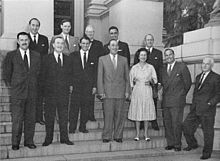Progressive Federal Party
The Progressive Federal Party (PFP, German about: Progressive Federal Party; previously Progressive Reform Party ) was a party in South Africa . For ten years it was the only party in the South African parliament that was in opposition to the ruling apartheid . It went into what is now the Democratic Alliance (DA, Democratic Alliance).
history

front row (from left): Walter Stanford, Harry Lawrence, Boris Wilson, Jan Steytler, Helen Suzman , Colin Eglin , Owen Williams
back row (from left): Ray Swart, Clive van Ryneveld, John Cope, Zach de Beer , Ronald Butcher
At the time of apartheid there were only parties that were separated according to "race" in South Africa. According to legal restrictions from 1936 and 1956, only white MPs were represented in parliament until the elections of 1984. There was always a minority among them who opposed apartheid and were liberal . These politicians were involved in different parties; her mother tongue was mostly English, less Afrikaans .
In 1959 the Progressive Party (PP) was founded as a liberal party, a spin-off from the United Party, which ruled until 1948 . From 1961 to 1974, the PP was only represented in parliament by Helen Suzman , who was the only MP to denounce apartheid at that time. In the 1974 election, the PP received seven seats. In 1975 another group of liberal members left the United Party and founded the Reform Party (Reform Party), which after a few months merged with the PP to form the Progressive Reform Party (PRP, Progressive Reform Party). In 1977 another group split off from the United Party ; she joined forces with the PRP to form the Progressive Federal Party . The aim of the PFP was a constitution with a federal structure and more rights for the non-white population, a free market economy and an independent judiciary .
The first party chairman was Colin Eglin , who had led the PRP since 1975. In the first national election after the party was founded in 1977, the party received 19 seats. In 1979 Frederik van Zyl Slabbert became party chairman. In 1981 the PFP received 26 mandates, made up the strongest opposition faction and thus became the “official opposition party”. In 1986, party chairman Frederik van Zyl Slabbert resigned from his posts and joined the extra-parliamentary opposition. His successor was again Colin Eglin. In the election on May 6, 1987, the PFP only won 19 seats, so that the Konserwatiewe Party (Conservative Party), a right-wing split from the ruling Nasionale Party (National Party ), became the strongest opposition party with 22 seats.
In 1988 there were internal party disagreements, as a result of which three members of parliament and other party members resigned from the party because of internal anti-Burian resentments against members and a controversial discussion about a meeting of 62 South African scientists organized by the Institute for a Democratic Alternative for South Africa and politicians with ANC representatives in Dakar during July 1987.
Some PFP members, Peter Gastrow, Pierre Cronjé and Pieter Schoemann, founded the National Democratic Movement (NDM ) with former NP members from the loose electoral alliance (1987) Independent Movement . The last party chairman of the PFP was Zach de Beer from 1988 to 1989 .
On April 8, 1989, the PFP, the NDM and the Independent Party (IP, Independent Party) united to form the Democratic Party (Democratic Party). This in turn merged in 2000 in the Democratic Alliance , which is now the official opposition party to the African National Congress (ANC).
In addition to the party leaders, there were other well-known PFP politicians. In 1974 Harry Schwarz and Mangosuthu Buthelezi signed the Mahlabatini Declaration of Faith , which called for a non-violent abolition of apartheid. In 1975 he was chairman of the Reform Party . Schwarz held several leadership positions in the PFP and was one of the most prominent opponents of apartheid in parliament. Helen Suzman was also regularly re-elected as a member of the PFP until 1989 and was proposed twice for the Nobel Peace Prize.
Others
The PFP were occasionally mocked by the Boers . So would PFP for Packing for Perth , eg "packing suitcases to in the Australian Perth emigrate".
Web links
- South African History Online : Progressive Federal Party (PFP) . on www.sahistory.org.za (English)
Remarks
- ↑ Towards the end of apartheid, 1984, the three-chamber system was introduced; the Chambers of the Colored and Indians and in the President's Council had little influence.
Individual evidence
- ^ A b Eric Louw, Gary Mersham: Packing for Perth: The Growth of a Southern African Diaspora . In: Asian and Pacific Migration Journal . tape 10 , no. 2 , 2001, p. 303 ( PDF [accessed May 27, 2010]).
- ^ A b South African History Online : Progressive Federal Party (PFP) . on www.sahistory.org.za (English)
- ^ SAIRR : Race Relations Survey 1987/88 . Johannesburg 1988, pp. 706-707, 761-765
- ↑ SAIRR: Survey 1987/88 . 1988, pp. 744-745